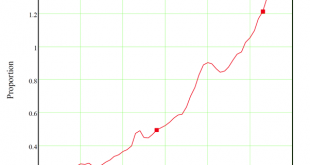I have recently established a Patreon site https://www.patreon.com/ProfSteveKeen, where people can support my research and advocacy work with donations starting at $1/month. That is now where I will engage in conversation in response to posts. So if anyone here wants to continue a dialogue with me and others, please sign up there. This site was flooded by a large number of spam users at the same time as I became unable to maintain my own role in discussions here,...
Read More »Brexit debate in London May 31st
I’m taking part in a debate on one of the major topics in this year’s election, Brexit, on May 31st at 7.30pm at Canham, 40 Sheen Lane, London SW14 8LW. The other speakers are Frances Coppola, and Angus Armstrong. Frances Coppola is an economic commentator in print and frequently on the BBC. Angus Armstrong is director of macro-economics at one of the top research institutions, the National Institute of Economic and Social Research founded in 1938. Click...
Read More »Freezing site/Moving to Patreon & Profstevekeen
I’m freezing this site and moving to both Patreon (https://www.patreon.com/ProfSteveKeen) and a new website http://www.profstevekeen.com/. There are several reasons: This site’s signup security failed, and something like 50,000 bot-users have signed up. It’s just too cumbersome in WordPress to delete them selectively from here, so it’s easier to move to a new, clean site; I used to be very active in discussions here, but the demands on my time became so excessive...
Read More »What if my analysis is used for evil purposes?
One of my Patrons posed a very good question to me: in a nutshell, how would I respond to a politician who took my ideas and perverted them for political gain? Here’s Andre’s full query: Hi Steve, thank you, you’ve given me the gift of some of the most important ideas and explanations I’ve come across in my lifetime. I was wondering how you might respond to a politician who misreads your latest book, and then declares: 1. People will love me, because Steve Keen says I can become...
Read More »Can we avoid another financial crisis?
Help me rebuild economics at https://www.patreon.com/ProfSteveKeen Can we avoid another financial crisis? In 2008, conventional economics led us blindfolded into the greatest economic crisis since the Great Depression. Almost a decade later, with the global economy wallowing in low growth that they can’t explain, mainstream economists are reluctantly coming to realise that their models are useless for understanding the real world. How did mainstream economists not see the crisis...
Read More »Support me on Patreon
Click here to support me on Patreon As I explain in this video, government attempts to turn University entrance into a marketplace have had the unintended side-effect of undermining pluralist economics. The UK government has removed controls on the number of places that Universities can offer in first year courses, and as a result there has been an increase in humanities places offered by highly ranked Universities. Final year high school students have flocked to these...
Read More »Infrastructure conference in Westminster Tuesday 24th
A new organisation called NEKS (for “New Economic Knowledge Services”, see www.neks.ltd) is holding its inaugural conference on the economics of infrastructure In Westminster on Tuesday January 24th, and you should attend. Why NEKS, and why Infrastructure? The economic importance of infrastructure is obvious, but the actual performance of infrastructure often differs radically from what is predicted when it is being planned. Three forms of delusion make many infrastructure...
Read More »Teaching Economics the Pluralist Way
This is a talk I gave in Amsterdam to launch the Amsterdam Rethinking Economics critique of the current state of economics “education” in the Netherlands. The text of my slides is reproduced below. [embedded content] Teaching Economics the Pluralist Way Steve Keen Kingston University London IDEAeconomics Minsky Open Source System Dynamicswww.debtdeflation.com/blogs General Principles Teach Honestly: “Warts and All” treatment of every school –Read the original sources—journals...
Read More »Prof. Steve Keen on private debt and his solution people’s QE
I’ve had some tough interviews over the years (such as the BBC HARDtalk! interview earlier this year with Stephen Sackur), but I’d have to credit the student interviewers at the University of Amsterdam’s Room for Discussion event with giving me the toughest, well-informed grilling my ideas have had in public. I’m following up later today with a keynote speech at the Dutch Rethinking Economics event tonight, and I’ll post that here later this week. [embedded content]...
Read More »My Speech at Occupy Sydney Five Years Ago
Apparently it’s the fifth anniversary of the day I gave this talk, to the Occupy movement in Sydney, in Martin Place, right outside the offices of the Reserve Bank of Australia. The day after, the site was shut down by the police. It seems I was jinxed, because the same thing happened in New York, the day after I simply dropped off a couple of copies of my book Debunking Economics. The speech holds up pretty well, though I’ve developed my technical arguments a lot since then....
Read More » Heterodox
Heterodox



